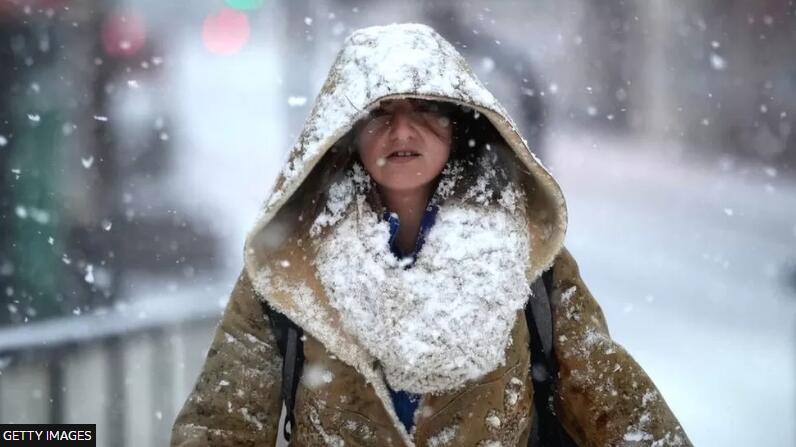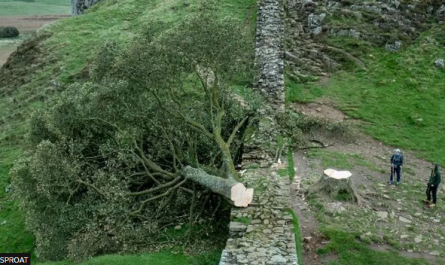A yellow weather warning is in place for snow and ice for Scotland, Wales, and south-west England.
On Sunday from 18:00 the warning for snow and ice spreads to include London and the South East.
Severe conditions are causing travel disruption and accidents on some motorways.
Manchester Airport briefly closed its runways on Saturday due to “heavy snow fall” in the morning.
Temperatures could also drop as low as -12C in northeast Scotland overnight on Sunday, which would be the lowest temperature the UK has seen since February 2021.
The Met Office said it expected freezing fog patches to become more extensive by Sunday morning.
It warned power cuts and mobile phone coverage might be affected and that the weather conditions could lead to more travel disruption, especially on Monday.
But it has ended its weather warning for Northern Ireland, despite the cold weather leading to some sporting fixtures being cancelled.
Snow has been settling in Devon and Wales as well as parts of Scotland and areas of north-west England.
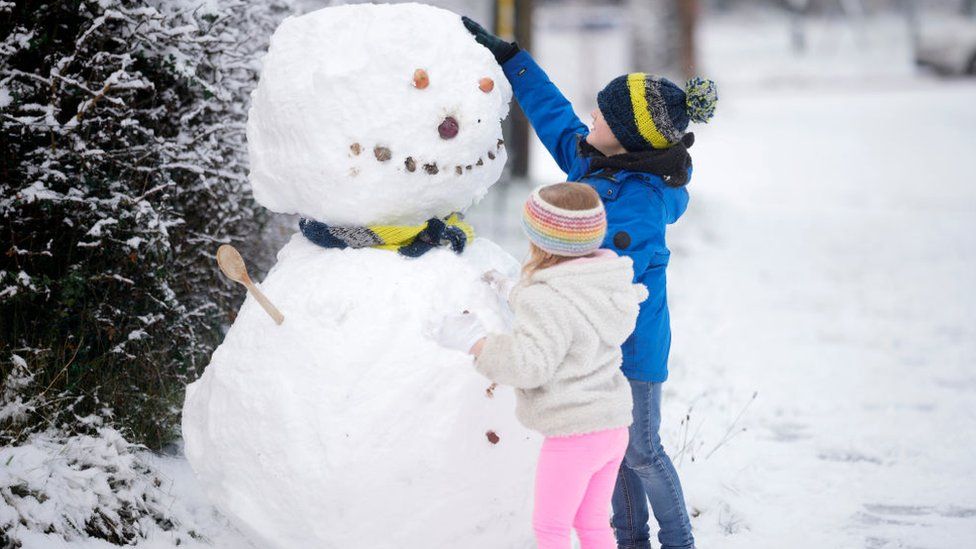
The Met Office’s yellow weather warnings for Sunday and Monday include:
- Snow and ice across northern and parts of central Scotland, as well all eastern areas until 12:00 on Sunday
- Ice for much of the western side of England, south-west Scotland and Wales until 12:00 on Sunday
- Ice and wintry showers to hit Belfast and Derry in Northern Ireland from 07:00 to 11:00 on Sunday
- Fog is set to cause low visibility across the East Midlands, East of England, as well as London and the South East until 11:00 on Sunday
- Snow and ice in northern Scotland from 12:00 on Sunday until 12:00 on Monday
- Snow and ice in London, the South East, and East of England from 09:00 on Sunday until 09:00 on Monday
Manchester Airport closed both runways on Saturday morning due to “heavy snow fall”, with dozens of flights affected.
The airport advised passengers to contact their airline for the latest on their flights.
Drivers in north-western England are also being advised to take care following accidents on motorways including the M58, M62, M61.
Met Office chief meteorologist Steve Willington said: “It is staying cold with daytime temperatures remaining only a few degrees above freezing in many places over the coming days and overnight temperatures dropping to -10C or lower in isolated spots.
“Although below average, these temperatures are not that unusual for this time of year.
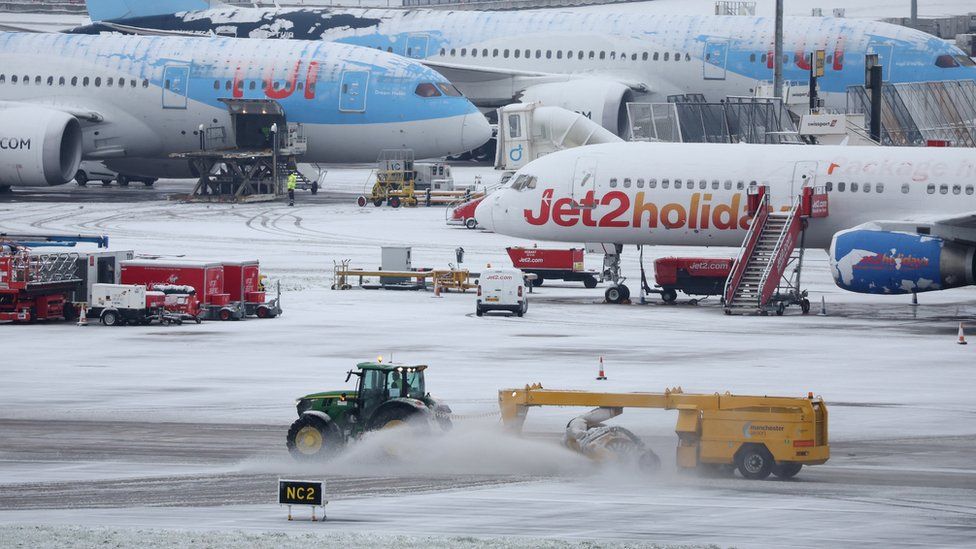
“There is still a risk we could see some freezing fog in places particularly southern England, especially for Sunday and Monday mornings.”
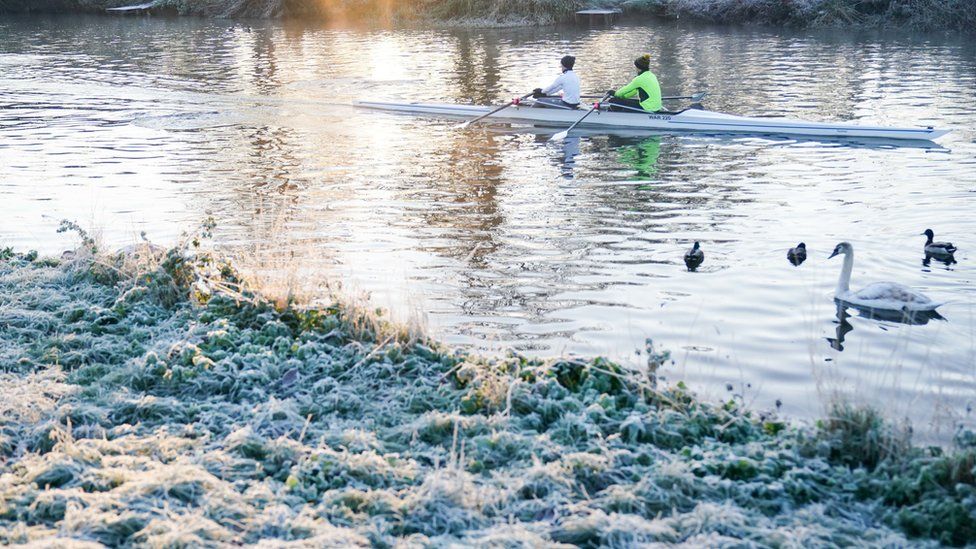
Meteorologist Stav Danaos said in his latest BBC Weather forecast that the cold spell is “here to stay for the foreseeable future”.
He said: “Through Saturday night it stays icy in northern and western areas where we’ve had the showers. Snow drifts southwards into southern Scotland and even north-eastern England too.”
He added: “Into Sunday we need to keep an eye on this weak area of low pressure developing towards the south east quadrant of England – that could develop into thicker cloud and perhaps some sleet and snow particularly later in the day, which could affect parts of the south-east and east Anglia.”
People are being advised to check on vulnerable family and friends to ensure they have access to warm food and drinks as the wintry conditions hit.
The UKHSA added that people should make sure indoor temperatures in their homes are at least 18C (64.4F).
Dr Agostinho Sousa, consultant in public health medicine at UKHSA, said: “Cold weather can have serious consequences for health and older people and those with heart or lung conditions can be particularly at risk.
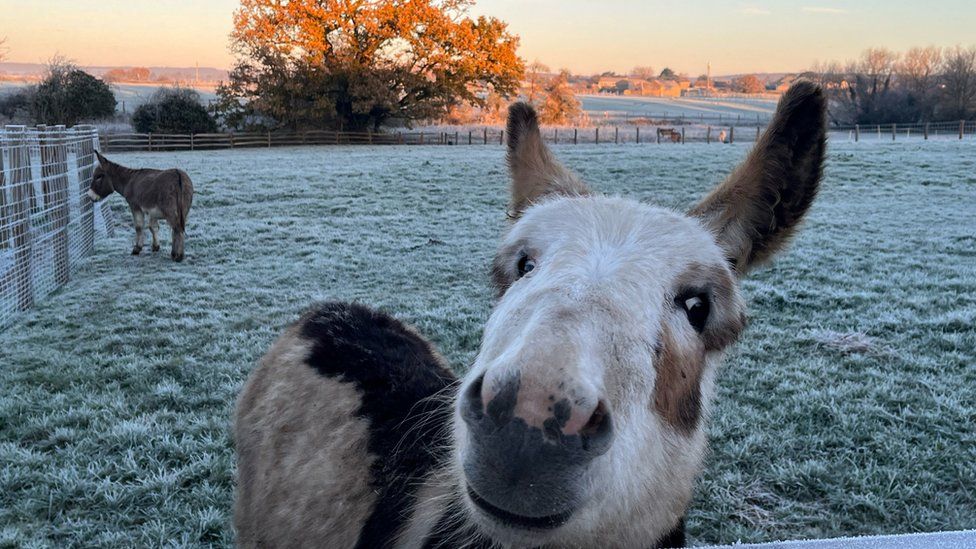
“If you have a pre-existing medical condition, you should heat your home to a temperature that is comfortable for you.
“In rooms you mostly use such as the living room or bedroom, try to heat them to at least 18C if you can. Keep your bedroom windows closed at night. Wearing several layers of clothing will keep you warmer than one thicker layer.”
Gritters will be out this weekend to help clear the roads and ease travel disruption.
Darren Clark, severe weather resilience manager at National Highways, said: “National Highways is committed to treating every road which needs to be treated – whenever it is needed.”
The RAC has added it has been “exceptionally busy” in recent days due to receiving a quarter more breakdowns than is normal for this time of year.
